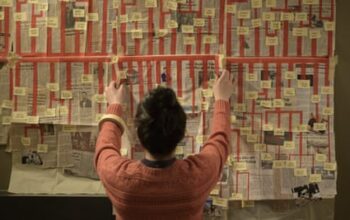Take a stroll through the classic English countryside of West Sussex, and you’ll notice things becoming strange just beyond the village of Dial Post. Here, a patchwork of tidy fields bordered by neat hedgerows becomes a bamboozling maze of flowery glades and thickets of hawthorn, blackthorn and sallow. Rabbits dart between billowing brambles, watched by a fallow deer sporting furry new antlers. Stranger than the unexpectedly abundant plants and mammals is the cacophony of birdsong – the common melodies of thrushes, robins and blackcaps but also songs virtually extinguished across Britain: cuckoos, nightingales and turtle doves. Oddest of all is a clacking noise that sounds like two hollow sticks being banged together.
“Isn’t it a great sound?” says Isabella Tree, landowner, author and now star of a new film, Wilding. “Storks have these pouches that make the sound echo and travel even further.” And there, in an enormous hammock of sticks at the top of an ancient oak, stand a pair of bill-clacking storks looking proudly over a tiny chick.
The transformation of Knepp from a conventional 3,500-acre farm into a place thrumming with wildlife in barely two decades is told by Wilding, as part of a growing filmic fascination – Soilywood? Ploughcore? – with environmentally minded farming. It follows the success of Clarkson’s Farm on the small screen and Six Inches of Soil. The latter was a particularly improbable documentary to show in cinemas across the country, but Wilding’s cinematic release is less surprising because it has already been a popular book, written by Tree, which has sold more than 300,000 copies in Britain and been translated into multiple languages. Her tale is captivating because it is true, heartening and unforeseen, especially because it begins with failure.
Tree was 18 when she fell in love with Charlie Burrell, also 18. In his 20s, Burrell inherited the Knepp estate. He had studied at Cirencester’s Royal Agricultural College and was determined to make the old family farm thrive. “He made all the brutal efficiencies of modern, smarter farming,” says Tree. “He industrialised as much as he could, which is what good farmers were supposed to do.” After 17 years of new crops, technologies and chemicals, he still couldn’t profit from Knepp’s heavy clay soils, which were waterlogged in winter and baked concrete-hard in summer. They were £1.5m in debt.
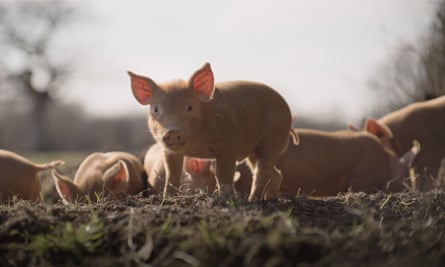
Then, in 2000, Burrell and Tree took a big, unconventional step: they stopped farming. Such a radical move was probably only possible because they were relatively young and felt like outsiders (Burrell grew up overseas and Tree was adopted). As Tree comments in the film, abandoning farming was “weighted with guilt and pride”. They couldn’t bear to witness the auction of their farm machinery.
“I found myself crying,” says Tree now. “Everything from semen flasks to shepherds’ huts. It was generations of farming and a whole culture. And you were just saying, ‘This hasn’t worked.’ All that effort. All those hopes and ambitions. It was horrible.”
But alongside the mourning were moments of euphoria. As the film shows, Burrell and Tree had begun to question their farming methods a few years earlier, after meeting ancient tree expert Ted Green (nominative determinism looms large in this story). He told them that their ancient hedgerow oaks were species-rich arks but in poor health, because decades of intensive farming had decimated their soils, destroying life-giving networks of mycorrhizal fungi.
Green introduced them to pioneering Dutch rewilder Frans Vera. Inspired by his theories, Burrell and Tree decided to “let go” of their acres, and introduce small numbers of cattle, ponies and pigs (and ultimately beavers) that would live wild and, through their grazing, engineer a new nature-rich landscape.
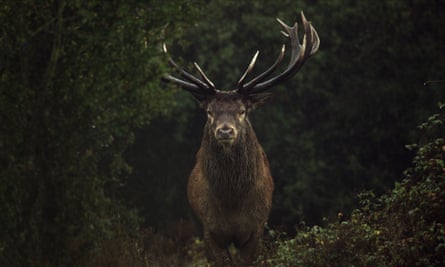
The film shows in full cinematic glory the burgeoning wildlife coming back. Alongside interviews with Tree and Burrell, there are reconstructions with actors playing the younger couple. The bulk of the film was made during 2020, the big lockdown year. “As if lockdown wasn’t surreal enough!” laughs Tree. “We’d go for a walk and bump into someone who looked very like the 1980s version of me. I love the reconstructions. They are so good. They even got actor pigs in.”
In one scene, Knepp’s wild pigs run amok in a wedding tent. In another, an Exmoor pony called Duncan stages a one-horse pitch invasion during a game of polo. The film illustrates the uncomfortable transition from conventional farming to wilding, which Tree and Burrell experienced very personally. They were ostracised for creating a messy, chaotic-looking English arcadia. Landowning peers declared Burrell’s grandparents would be rolling in their graves. The couple were accused of spreading ragwort, legally defined as an “injurious weed” because it is poisonous to livestock. They fretted about the proliferation of creeping thistle, too, but that proved one of many problems fixed by nature: an invasion of migratory painted lady butterflies saw their caterpillars munch the thistles into oblivion.
Over the last decade, Knepp has become a dramatic success story. This can be measured in nightingales (69 singing males across Knepp – conventional nature reserves are delighted if they attract five); storks (24 nests and 93 eggs this year for the reintroduced species); carbon (new studies suggest regenerating soil and scrub at Knepp sequesters as much if not more carbon as newly planted deciduous woodland); and full-time employees (from 23 on the conventional farm to 90 today). There has also been a stampede of farmers following their example: unlike most orthodox farms, Knepp is profitable even without counting government environmental payments.
The film will only increase another measure of Knepp’s success: the visitors enjoying its 16 miles of footpaths, wildlife tours, glamping facilities, farm shop, cafe and restaurant. “When we started the project,” says Tree, “we had no idea there would be alternative income streams. We just knew it was the right thing to do for the land. But we were still thinking, ‘God, how are we going to make the estate work financially?’ We certainly didn’t think there would be tens of thousands of people visiting.”
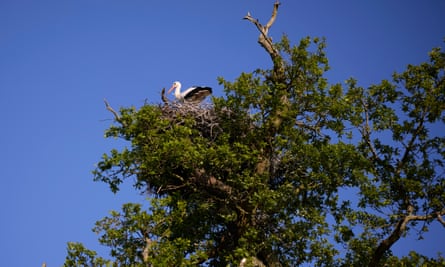
Today, Tree struggles to find the balance between “engaging people with nature, getting young people into it” and visitors overwhelming the wildlife. She worries about professional dog-walkers who bring six dogs each, given that a spaniel’s nose is precisely the height of a nesting nightingale. Dog-walkers post delightedly on social media about Knepp’s ponds being perfect for doggy wild swimming. But this is less perfect for aquatic wildlife, as anti-flea treatments spread from dogs to the wider environment.
“It’s become people management now,” says Tree. “I have an issue with Guy Shrubsole,” she says, referring to the co-founder of the Right to Roam campaign group. “Who wouldn’t want their child to be able to swim in every pond? But we haven’t yet got enough countryside with recovered wildlife in it to let loose the population – we’ve got to protect areas for wildlife too.” She hopes a balance can be struck: one riverbank for a path, say, the opposite one kept for wildlife.
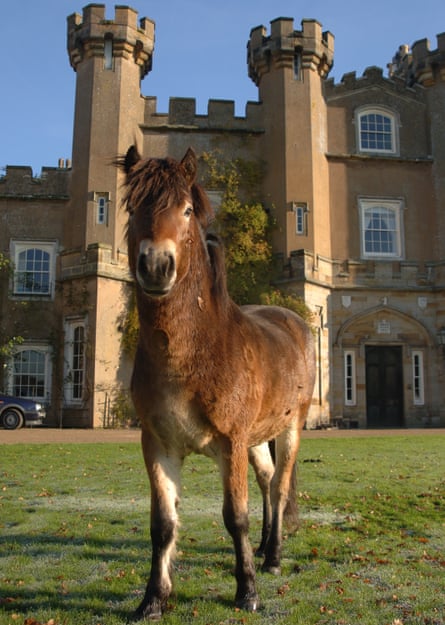
Tree is used to batting away arguments that Knepp’s seismic shift is endangering our food security. “On the planet,” she says, “we’re producing enough food for 11 billion people. We are eight billion people now – we waste 30-40% of our food. We’ve got to stop that. The agriculture we have is not sustainable. We’ve got to move away from intensive livestock. We’ve got to think about our intake of meat and where it comes from.”
For Tree, “rewilding is farming’s most natural ally and they shouldn’t be separated or pitted against each other”. Food production requires the natural services that wilding provides: pollination, healthy soils, clean water, fewer floods. “Unless we have ribbons of functioning nature running throughout our cities, countryside and agricultural areas, we’re missing that life-support system for food production.”
Where next for Knepp? Tree is writing a book about its storks, which she and Burrell hope are a symbol that can reconnect people and wildlife. Both of their grownup children are involved in Knepp’s wilding too – son Ned overseeing the restaurant and daughter Nancy researching soil and carbon sequestration.
What if the next generation rebelled against Tree and Burrell’s labours? “Rewilding teaches you to let go,” says Tree. “Charlie feels very strongly that the next generation will have to respond to all sorts of pressures we can’t imagine. Maybe we do suddenly have to grow food on inappropriate land again, like Dig for Victory. Our children have grown up with rewilding and they love it but it’s really important not to saddle the next generation with something you have come up with. If they think it’s great, they’ll continue it.”
Source: theguardian.com

